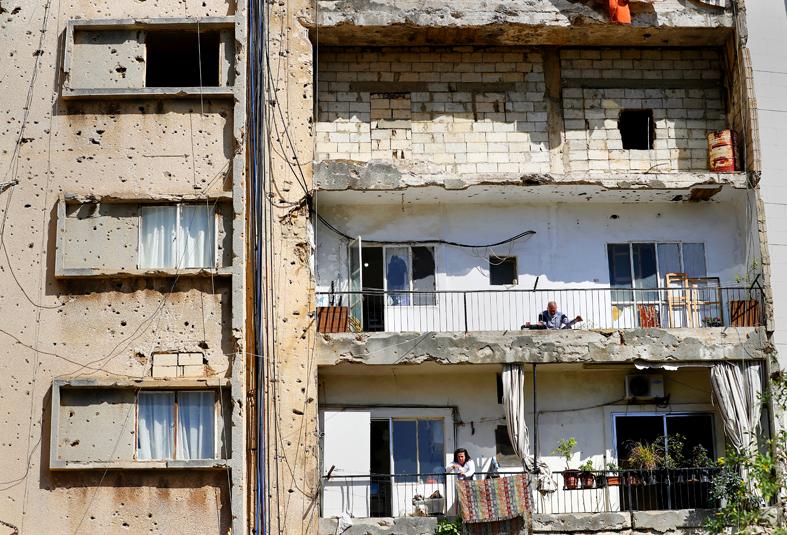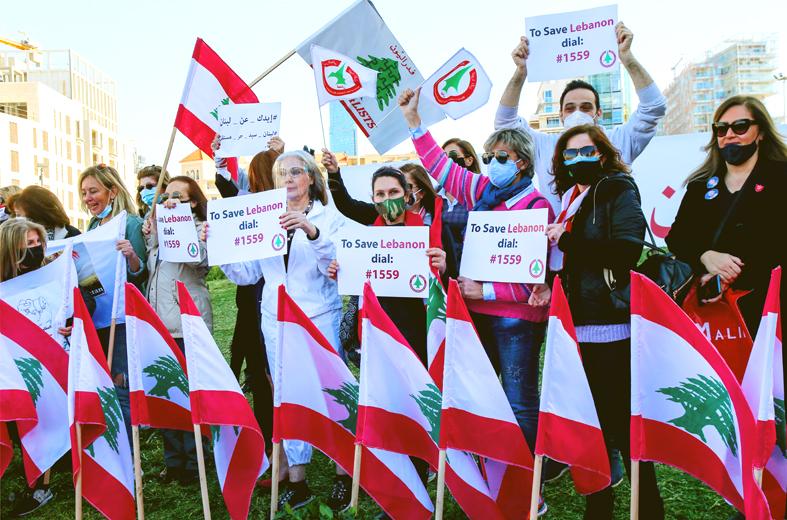During the Lebanese civil war, which ended more than 30 years ago, Abla Barotta survived shelling and clashes, but she now fears a “slow death” amid the nation’s worst economic crisis in decades.
The 58-year-old mother of three is a survivor who worries that she will soon join the more than 50 percent of Lebanese living in poverty.
Echoing a common refrain on television and at public gatherings, Barotta said that even the worst days of the war were not this tough.

Photo: AP
“We used to hide in houses or basements every time we heard shelling during the war, but today, where can we go to hide from hunger, the economic crisis, the [COVID-19] coronavirus pandemic and our political leaders?” she asked.
“We used to fear death from bombardment or sniper fire, but now we fear everything: illness, poverty and hunger,” she said.
“To die from shelling is better, at least there is no suffering ... while today, we suffer and die slowly every day,” she said.

Photo: EPA-EFE
Lebanon on Tuesday marked 46 years since clashes erupted in Beirut between Christians, and Palestinians backed by leftist and Muslim factions, marking the start of a 15-year conflict that drew in regional powers Israel and Syria.
At the time, the country was divided into warring sectarian fiefdoms.
However, many preserved a semblance of normal life between bouts of heightened violence and kidnappings.
The wheels of Lebanon’s economy kept turning, bolstered by money and weapons sent to warring parties from abroad.
After the conflict ended in 1990, with 150,000 people killed and 17,000 missing, bitter political divisions continued to plague Lebanon.
Endless political deadlock, as well as alleged corruption and negligence, finally gave way to a financial slump now sounding the death knell for a fragile middle class.
Since 2019, the Lebanese pound has lost more than 85 percent of its value against the US dollar on the black market, while prices have soared.
People have come to blows in supermarkets to secure fast-selling subsidized products, while shortages in pharmacies have made buying medicines akin to hunting for treasure.
Yet authorities have done little to stem a crisis compounded by the COVID-19 pandemic and by a port blast on Aug. 4 last year, which killed more than 200 people and ravaged swathes of Beirut.
“The war was ugly ... but we never lived through anything like this economic crisis,” Barotta said in her Beirut home, which was hard hit by the explosion.
Her first-floor apartment in an old building in the Mar Mikhail neighborhood next to the port has since been renovated and her neck has healed from a blast injury.
However, there is plenty left to worry about, she said.
“This anxiety over whether we will be able to eat tomorrow ... we’ve never lived that before,” she said. “Sometimes I can’t sleep at night.”
In the blast-strewn Karantina District, also next to the port, Jean Saliba pointed to gutted buildings awaiting renovation and listed the names of families who lost loved ones in Lebanon’s worst peacetime disaster.
Karantina has since become inundated with non-governmental organizations (NGO) spearheading the reconstruction effort.
“We haven’t seen the state,” said Saliba, a 63-year-old former civil servant.
“If it weren’t for the money and food handouts distributed by NGOs, people wouldn’t have had the strength to go on.”
Saliba called the monster blast a “collective catastrophe” that made the wartime suffering look like “a drop in the ocean.”
During the war, people could go back to work when bombardment slowed, he said.
However, with unemployment rates approaching 40 percent, many Lebanese today do not have jobs to return to.
“Who can earn money at all today?” the father of three asked. “Economically, we are finished.”
Elsewhere in the capital, Victor Abu Kheir sat idly inside his small barber shop in the Hamra neighborhood.
“There are days when I only have one customer, or two at most,” the 77-year-old said, wearing an apron.
Since it opened in 1965, the decor of the store has remained unchanged, its black leather armchair and glass cabinets harking back to a brighter past.
The civil war days were more “merciful” than those of today’s crisis, even if he was briefly kidnapped and survived gunfire hitting his shop, Abu Kheir said.
“No one prefers war, but those days were better,” he said, adding that he only ever lowered his blinds when bombardments spiked.
“There was money and the people were comfortable,” he said.

The Philippine Department of Justice yesterday labeled Vice President Sara Duterte the “mastermind” of a plot to assassinate the nation’s president, giving her five days to respond to a subpoena. Duterte is being asked to explain herself in the wake of a blistering weekend press conference where she said she had instructed that Philippine President Ferdinand Marcos Jr be killed should an alleged plot to kill her succeed. “The government is taking action to protect our duly elected president,” Philippine Undersecretary of Justice Jesse Andres said at yesterday’s press briefing. “The premeditated plot to assassinate the president as declared by the self-confessed mastermind

CHAGOS ISLANDS: Recently elected Mauritian Prime Minister Navin Ramgoolam told lawmakers that the contents of negotiations are ‘unknown’ to the government Mauritius’ new prime minister ordered an independent review of a deal with the UK involving a strategically important US-UK military base in the Indian Ocean, placing the agreement under fresh scrutiny. Under a pact signed last month, the UK ceded sovereignty of the Chagos archipelago to Mauritius, while retaining control of Diego Garcia — the island where the base is situated. The deal was signed by then-Mauritian prime minister Pravind Jugnauth and British Prime Minister Keir Starmer on Oct. 3 — a month before elections in Mauritius in which Navin Ramgoolam became premier. “I have asked for an independent review of the

Czech intelligence chief Michal Koudelka has spent decades uncovering Russian spy networks, sabotage attempts and disinformation campaigns against Europe. Speaking in an interview from a high-security compound on the outskirts of Prague, he is now warning allies that pushing Kyiv to accept significant concessions to end the war in Ukraine would only embolden the Kremlin. “Russia would spend perhaps the next 10 to 15 years recovering from its huge human and economic losses and preparing for the next target, which is central and eastern Europe,” said Koudelka, a major general who heads the country’s Security Information Service. “If Ukraine loses, or is forced

THIRD IN A ROW? An expert said if the report of a probe into the defense official is true, people would naturally ask if it would erode morale in the military Chinese Minister of National Defense Dong Jun (董軍) has been placed under investigation for corruption, a report said yesterday, the latest official implicated in a crackdown on graft in the country’s military. Citing current and former US officials familiar with the situation, British newspaper the Financial Times said that the investigation into Dong was part of a broader probe into military corruption. Neither the Chinese Ministry of Foreign Affairs nor the Chinese embassy in Washington replied to a request for confirmation yesterday. If confirmed, Dong would be the third Chinese defense minister in a row to fall under investigation for corruption. A former navy